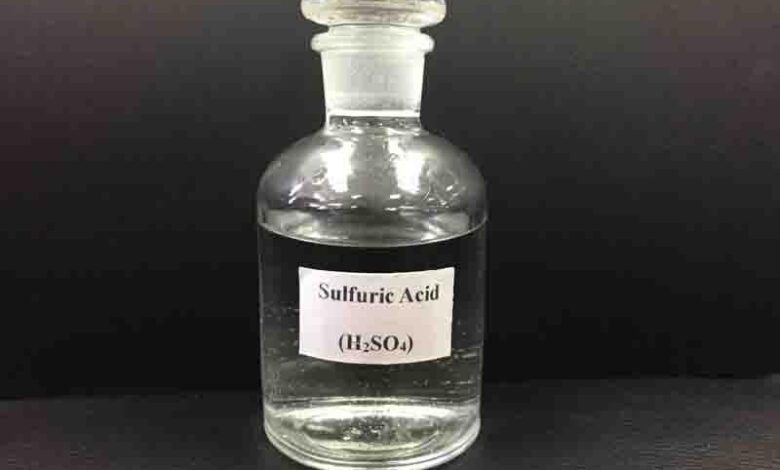Dil Sulphuric Acid Uses, Properties, and Applications Explained

Sulphuric acid is one of the most important industrial chemicals known to humankind. Among its different forms, dil sulphuric acid plays a vital role in both everyday life and specialized industries. While concentrated sulphuric acid is highly corrosive and widely known for its dehydrating and oxidizing properties, the dilute form is relatively safer to handle and more versatile in application. Understanding the chemistry, properties, and uses of dil sulphuric acid helps students, professionals, and industries alike appreciate why it is often referred to as the “king of chemicals.”
Unlike concentrated acid, which is primarily reserved for heavy industrial use, dil sulphuric acid is more commonly found in laboratories, schools, batteries, and even household cleaning products. Despite being less aggressive than its concentrated counterpart, it still demands respect due to its corrosive nature and potential hazards. This article explores dilute sulphuric acid in detail—from its definition and properties to its preparation, uses, and safety precautions—so that you gain a complete understanding of this important chemical.
What is Dilute Sulphuric Acid?
Dilute sulphuric acid is essentially a mixture of sulphuric acid (H₂SO₄) with water, reducing its concentration and reactivity. In simple terms, it is sulphuric acid that has been carefully diluted with water to make it more manageable for chemical reactions and practical use. The concentration can vary depending on the application, ranging anywhere from a few percent to around 20–30%. In laboratories, a 1M to 2M solution of sulphuric acid in water is commonly used for experiments and educational purposes.
The preparation of dilute sulphuric acid must always be done with caution. One of the golden rules in chemistry is “always add acid to water, never water to acid.” This is because adding water to concentrated acid can cause an explosive reaction due to the intense heat released during dilution. By adding acid slowly to water, the heat dissipates safely, preventing dangerous splashes. Physically, dilute sulphuric acid appears as a colorless, odorless liquid that is highly soluble in water and strongly acidic in nature. It conducts electricity due to the presence of free hydrogen ions, making it a useful electrolyte in various applications.
Properties of Dil Sulphuric Acid
Physical Properties
Dil sulphuric acid retains many of the physical characteristics of concentrated acid, though in a milder form. It is colorless, tasteless (though tasting is never advised for safety reasons), and odorless. The solution is highly soluble in water and releases significant heat when mixed. Its density and viscosity decrease compared to concentrated sulphuric acid, making it easier to handle and measure. Another important property is its ability to conduct electricity, which stems from the high concentration of hydrogen ions (H⁺) in solution.
Chemical Properties
Chemically, dil sulphuric acid exhibits strong acidic behavior. It reacts with metals such as zinc, iron, and magnesium to produce hydrogen gas. It also reacts with bases like sodium hydroxide to form salts and water in neutralization reactions. When combined with carbonates or bicarbonates, it liberates carbon dioxide gas. Unlike concentrated sulphuric acid, its oxidizing and dehydrating powers are much weaker, but it still plays a crucial role in driving many reactions. These properties make dil sulphuric acid an essential reagent in laboratories, schools, and industrial chemical processes.
Uses and Applications of Dil Sulphuric Acid
Industrial Uses
In industry, dil sulphuric acid finds application in fertilizer production, especially in the manufacture of ammonium sulfate and phosphates that are vital for agriculture. It is also used in the petroleum industry for refining crude oil, improving fuel quality, and removing impurities. The textile and dye industries rely on it for processing fibers, while the paint and pigment sectors use it as a reagent in synthesis. In the battery manufacturing industry, dil sulphuric acid acts as the electrolyte in lead-acid batteries, ensuring smooth conduction of electric current.
Laboratory Uses
In educational and research laboratories, dil sulphuric acid is indispensable. It serves as a reagent in titrations, helping chemists determine concentrations of unknown solutions. It is also used in electrochemistry experiments as an electrolyte to demonstrate conductivity and electrolysis principles. Additionally, it plays a role in preparing other compounds and solutions for experiments, making it one of the most frequently used laboratory chemicals.
Daily Life Applications
While industrial and laboratory applications dominate, dilute sulphuric acid also makes appearances in daily life. It is sometimes present in certain cleaning products and drain cleaners, although in much lower concentrations for safety reasons. Its role in batteries directly impacts daily use of automobiles, backup power supplies, and renewable energy storage systems. In education, dilute sulphuric acid helps students learn the fundamentals of chemistry through safe, controlled experiments.
Preparation and Handling of Dilute Sulphuric Acid
Preparing dilute sulphuric acid requires precision and strict adherence to safety protocols. The dilution process should always involve slowly adding concentrated sulphuric acid to water with continuous stirring. This ensures that the heat generated disperses into the larger water volume, preventing violent reactions. Using proper equipment such as glass beakers, measuring cylinders, and safety gear like goggles, gloves, and aprons is mandatory when handling the acid.
Storage of dilute sulphuric acid should be done in corrosion-resistant containers, typically made of glass or specific types of plastic. It must be kept in a cool, well-ventilated area away from direct sunlight and incompatible chemicals such as organic compounds and strong bases. Disposal should follow strict environmental regulations, often requiring neutralization with a base like sodium bicarbonate before safe disposal. Careless handling can result in burns, toxic fumes, and environmental harm, so every step must be carried out with caution.
Safety Precautions and Hazards

Despite being less dangerous than concentrated acid, dilute sulphuric acid still poses significant risks. It is highly corrosive to skin, eyes, and mucous membranes, and accidental contact can result in severe burns. Inhalation of vapors or mist can irritate the respiratory system, while ingestion is extremely harmful and potentially fatal. Hence, personal protective equipment (PPE) such as safety goggles, gloves, and lab coats are non-negotiable when working with the acid.
In case of an accident, immediate first aid measures must be taken. If the acid comes in contact with skin, the affected area should be washed thoroughly with plenty of water. For eye exposure, flushing with clean water for at least 15 minutes is recommended, followed by immediate medical attention. Accidental ingestion requires urgent medical assistance, and the victim should never be made to vomit. Workplaces and laboratories should have safety showers, eyewash stations, and neutralizing agents readily available to minimize risks.
Dilute vs. Concentrated Sulphuric Acid
While both forms share the same chemical formula, their properties and applications differ significantly. Concentrated sulphuric acid is a strong oxidizing and dehydrating agent, often used in the production of explosives, detergents, and synthetic chemicals. It is far more hazardous to handle and requires extreme care. In contrast, dilute sulphuric acid is primarily used in educational labs, batteries, and industrial processes where controlled reactions are needed.
A key difference lies in their reactivity. Concentrated acid chars organic materials and absorbs water aggressively, while the dilute form is better suited for neutralization reactions and controlled chemical processes. For this reason, the two forms complement each other in industrial chemistry but are never interchangeable in application.
Conclusion
Dilute sulphuric acid is more than just a weakened form of a powerful chemical—it is a versatile, indispensable tool in industry, laboratories, and education. Its physical and chemical properties allow it to participate in a wide variety of reactions, making it valuable in fertilizers, batteries, cleaning agents, and scientific experiments. However, safety should always be a priority, as even in diluted form, it remains corrosive and hazardous. By understanding its preparation, uses, and precautions, we can harness the benefits of dilute sulphuric acid while minimizing the risks associated with its handling.
FAQs About Dilute Sulphuric Acid
What is the formula of dilute sulphuric acid?
The formula is the same as concentrated acid, H₂SO₄, but with water added to reduce its concentration.
How is dilute sulphuric acid prepared safely?
Always add concentrated sulphuric acid slowly to water with constant stirring, never the other way around.
What are the major differences between dilute and concentrated sulphuric acid?
Dilute acid is weaker, safer to handle, and commonly used in laboratories and batteries, while concentrated acid is stronger, highly corrosive, and used in heavy industries.
Can dilute sulphuric acid be used for cleaning purposes?
Yes, in some drain cleaners and cleaning agents, but usually at very low concentrations for safety.
Is dilute sulphuric acid harmful to humans?
Yes, it can cause burns, irritation, and toxicity if not handled properly.
Why is dilute sulphuric acid used in batteries?
It acts as an electrolyte, allowing the flow of electric current in lead-acid batteries.
What happens when dilute sulphuric acid reacts with metals?
It produces hydrogen gas and a salt of the respective metal.
Can dilute sulphuric acid conduct electricity?
Yes, because it dissociates into ions in water, allowing current to flow.
How should dilute sulphuric acid be stored?
In corrosion-resistant containers, in a cool, ventilated place away from incompatible substances.
What precautions should be taken while handling dilute sulphuric acid?
Always wear protective equipment, handle with care, and follow proper storage and disposal protocols.
You May Also Read: Mod West Freugh



